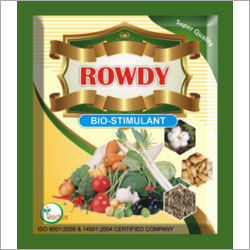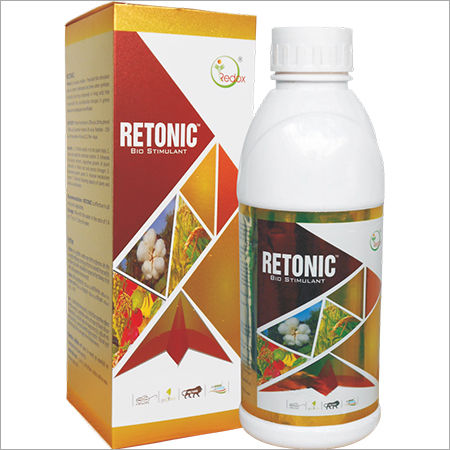Product Description
Rowdy Plant Growth Promoter provided by our company, is mainly used to improve the overall growth and health of the plants. This promoter is a natural/herbal fertilizer, especially designed for the overall growth of the plants. This promoter is clinically tested under various parameters to ensure its high quality and flawlessness. Rowdy Plant Growth Regulator requires very low maintenance and replacement costs. This promoter is very effective as it increases the quality of the yield. This promoter can be easily purchased by our clients at reasonable rates, in bulk quantities.
Rowdy Plant Growth Promoter Specifications:
1. Brand Name: Rowdy
2. Pack Size: 10gm, 100gm, 250gm, 500gm, 1kg
3. Form: Powder
4. Pack Type: Pouch and Bags
5. Target Crops: All types of Vegetables and Feild crops
6. Probiotic Content: Humic Acid + Orthophenols
7. Dosages: 150-250 gm per acre
Plant Growth Promoter Applications:
1. Seed Treatment: PGPs can be applied as seed treatments to enhance germination, seedling vigor, and early root development. This ensures better establishment of crops, especially under adverse conditions.
2. Foliar Sprays: PGPs are often applied as foliar sprays, which are sprayed directly onto the leaves of plants. This method allows for rapid absorption of the growth-promoting compounds, which can stimulate vegetative growth, flowering, and fruiting.
3. Soil Application: PGPs can be incorporated into the soil either as granules, liquids, or powders. This helps in improving soil health, nutrient availability, and root growth, leading to better nutrient uptake and overall plant growth.
4. Root Drenching: Applying PGPs directly to the roots of plants through drenching or irrigation systems promotes root development, nutrient absorption, and water uptake, resulting in healthier and more resilient plants.
5. Stress Management: PGPs are used to mitigate various environmental stresses such as drought, salinity, heat, and cold. They help plants cope with adverse conditions by improving their tolerance mechanisms and reducing stress-induced damage.
6. Fruit and Flower Development: PGPs are often applied during the reproductive stages of plants to enhance flower formation, fruit set, and fruit development. This can lead to increased yield, improved fruit quality, and uniform ripening.
7. Crop Protection: Some PGPs possess natural antimicrobial or antifungal properties, which can help protect plants from diseases and pathogens. They act as bio-stimulants, enhancing the plant's own defense mechanisms.
8. Organic Farming: PGPs are widely used in organic farming practices as they are derived from natural sources and help reduce reliance on synthetic fertilizers and pesticides. They promote sustainable agriculture by improving soil fertility and reducing environmental impact.
9. Hydroponics and Aeroponics: In soilless cultivation systems such as hydroponics and aeroponics, PGPs are essential for providing plants with the necessary nutrients and growth-promoting substances since these systems rely entirely on nutrient solutions.
10. Post-harvest Treatment: Some PGPs are used post-harvest to extend the shelf life of fruits and vegetables by delaying senescence, reducing spoilage, and maintaining quality attributes such as color, texture, and flavor.
Plant Growth Promoter FAQ:
Q. What are plant growth promoters (PGPs)?
Ans: Plant growth promoters are substances that stimulate and enhance the growth, development, and productivity of plants. They can be natural or synthetic compounds that influence various physiological processes in plants.
Q. What are the types of plant growth promoters?
Ans: Plant growth promoters can be classified into different categories based on their mode of action, chemical composition, and origin. Common types include phytohormones (such as auxins, cytokinins, gibberellins), biostimulants (such as humic acids, seaweed extracts), microbial inoculants (such as beneficial bacteria, fungi), and nutrient supplements (such as micronutrients, amino acids).
Q. How do plant growth promoters work?
Ans: Plant growth promoters work through various mechanisms such as stimulating cell division and elongation, enhancing nutrient uptake and utilization, improving stress tolerance, promoting root growth, and modulating hormonal balance in plants. They can also interact with plant-microbe interactions to enhance nutrient availability and plant health.
Q. What are the benefits of using plant growth promoters?
Ans: Using plant growth promoters can result in increased crop yield, improved crop quality, enhanced stress tolerance, faster growth and development, better nutrient efficiency, and overall healthier plants. They can also contribute to sustainable agriculture practices by reducing the need for synthetic inputs and improving soil health.
Q. Are plant growth promoters safe for the environment and human health?
Ans: Most plant growth promoters are considered safe for the environment and human health when used according to recommended guidelines. However, it's essential to follow proper application practices to minimize any potential risks associated with their use, such as runoff into water bodies or residues on food crops.
Q. How should I apply plant growth promoters?
Ans: The application method of plant growth promoters depends on factors such as plant species, growth stage, environmental conditions, and the type of promoter used. Common application methods include seed treatment, foliar sprays, soil drenching, root dipping, fertigation (application through irrigation systems), and post-harvest treatments.
Q. When is the best time to apply plant growth promoters?
Ans: The timing of application varies depending on the specific growth stage and requirements of the plants. In general, it's best to apply plant growth promoters during periods of active growth, such as early vegetative stages, flowering, and fruit set. However, it's essential to follow product-specific recommendations for optimal timing.
Q. Can plant growth promoters be used in organic farming?
Ans: Yes, many plant growth promoters are approved for use in organic farming practices as they are derived from natural sources and comply with organic certification standards. However, it's crucial to verify that the specific product is certified for organic use and meets regulatory requirements.
Q. Are plant growth promoters compatible with other agricultural inputs?
Ans: Plant growth promoters can generally be used in conjunction with other agricultural inputs such as fertilizers, pesticides, and biostimulants. However, it's essential to check for compatibility and potential interactions between products to ensure efficacy and avoid any adverse effects on plants.
Q. Where can I find more information about plant growth promoters?
Ans: You can find more information about plant growth promoters from agricultural extension services, research institutions, universities, agricultural input suppliers, and online resources such as scientific journals, publications, and reputable websites specializing in agriculture and horticulture.

 English
English Spanish
Spanish French
French German
German Italian
Italian Chinese (Simplified)
Chinese (Simplified) Japanese
Japanese Korean
Korean Arabic
Arabic Portuguese
Portuguese





